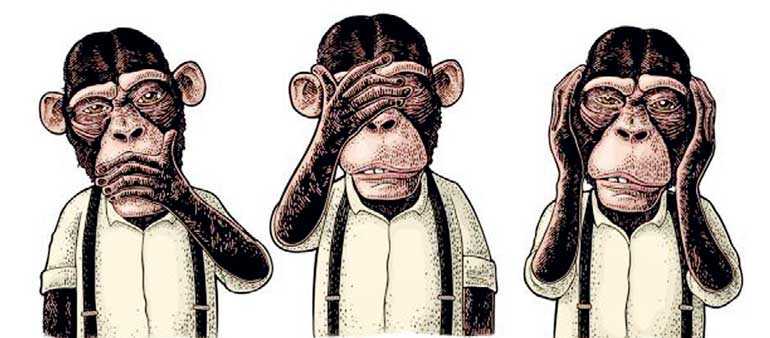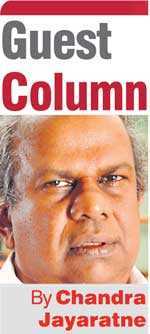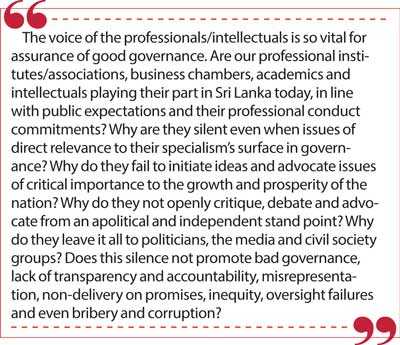Wednesday Feb 18, 2026
Wednesday Feb 18, 2026
Tuesday, 11 May 2021 00:00 - - {{hitsCtrl.values.hits}}

Society at large looks forward to the day that professionals and intellectuals discard their ‘see no evil, hear no evil, speak no evil’ stance resembling the three monkey faces with eyes, ears and mouth closed
 William Hague once stated, “Inspiring scenes of people taking the future of their countries into their own hands will ignite greater demands for good governance and political reform elsewhere in the world, including in Asia and in Africa.” Will we in Sri Lanka see such a move in the post-independence era, with the professionals and intellectuals in society giving leadership?
William Hague once stated, “Inspiring scenes of people taking the future of their countries into their own hands will ignite greater demands for good governance and political reform elsewhere in the world, including in Asia and in Africa.” Will we in Sri Lanka see such a move in the post-independence era, with the professionals and intellectuals in society giving leadership?
The voice of the professionals/intellectuals is so vital for assurance of good governance. Are our professional institutes/associations, business chambers, academics and intellectuals playing their part in Sri Lanka today, in line with public expectations and their professional conduct commitments? Why are they silent even when issues of direct relevance to their specialism’s surface in governance? Why do they fail to initiate ideas and advocate issues of critical importance to the growth and prosperity of the nation?
Why do they not openly critique, debate and advocate from an apolitical and independent stand point? Why do they leave it all to politicians, the media and civil society groups? Does this silence not promote bad governance, lack of transparency and accountability, misrepresentation, non-delivery on promises, inequity, oversight failures and even bribery and corruption?
The absence of the intellectual voice, debate and advocacy on the following challenging issues, along with the lack of follow up essential leadership representations with commitment, when governance decisions are unacceptable, are a slur on the societal expectations of professional ethics and standards of conduct by professional institutes/associations, business chambers and academics:
Ministerial pronouncement that the country does not require a loan from the International Monetary Fund, based on its current economic status, and that Sri Lanka will have forex flows of $ 32 billion in 2021, inclusive of Port City Investments of $ 2.5 billion;
Fund, based on its current economic status, and that Sri Lanka will have forex flows of $ 32 billion in 2021, inclusive of Port City Investments of $ 2.5 billion;
In line with the above policy decision, should the country say “no thank you” even to the enhanced Special Drawing Rights due for approval by the IMF soon?;
Ministerial pronouncement that Sri Lankan Rupee will appreciate against the US Dollar again to the level of Rs. 185 and no unnecessary fear should be entertained;
Ministerial pronouncement on the adequacy of the CWE distributed Rs. 1,000 ‘Sahana Malla’ to feed a household of four persons for a specified period;
Decision to impose a ban on imports of turmeric ignoring the local production capacity shortfall in the interim, which shortfall can be met only years into the future;
Sri Lanka destroying the consignments of turmeric seized whilst being smuggled in to Sri Lanka; without handing it over to a State owned Ayurvedic medicinal manufacturing enterprise for use in medicinal preparations;
Inconsistent, often varied along with several exemptions accompanied import restrictions policy; where the initial suspension of the facilitation of imports of 156 categories of products under certain payment methods (including rice, flour, sugar, bakery products, apparel products, ceramics, and furniture) came into operation; whilst permitting the imports of 111 categories of items (such as milk, dried vegetables, palm oil, electrical appliances and construction materials), only on a credit basis, without stakeholder voice being considered;
The later sudden imposition of palm oil imports ban, along with restrictions on establishing new palm oil plantations, and requiring present plantations to uproot existing plantations in a phased manner;
In the validation of whether coconut oil distributed had excessive levels of aflatoxin, 125 samples were collected island wide; and out of which 55 samples were tested in the first batch and announced that the average level of the 55 samples taken together was below set maximum limit (i.e. not how many of the 55 samples tested had levels of aflatoxin above standards);
A senior official of the Sri Lanka Standards Bureau confirming that there are many food items in the market which contain aflatoxin and the identity of companies importing them could not be divulged as certain manufacturing processes could even collapse if it was done;
Ministerial pronouncement that there was no relationship between money printing by the Central Bank of Sri Lanka and the depreciation of the local rupee in the foreign currency market;
Central Bank suspending the licensed commercial banks from entering into forward rate agreements for foreign exchange without consultation of relevant stakeholders;
Central Bank requiring every exporter of goods, immediately upon the receipt of such export proceeds into Sri Lanka, within 180 days from export ( imposed at a time the overseas buyers were pressurising suppliers to extend enhanced credit periods) to convert 25% from and out of the total of the exports proceeds received in Sri Lanka into rupees through a licensed bank, whilst at the same time having directed Licensed Banks to sell to the Central Bank 50 per cent of export proceeds converted into Sri Lanka rupees by exporters (12.5 per cent of total foreign exchange earnings), and followed up action with these directions being changed several times during a short period;
Decision to impose an immediate ban on the imports of chemical fertilisers, herbicides and weedicides, without timely notice, professional research of consequential impacts and associated socio economic risks, stakeholder discussions and without an appropriate time lag for substitute products to be available in the market to meet demand;
The failure to examine whether the Port City related investments and operations will in the longer term add significant cumulative net cash inflow returns to Sri Lanka, corresponding to the level of national resources allocated, utility services provided and attractive tax and other concessions and incentives granted;
The failure to examine carefully whether the Port City investors will have significant comparative advantages over local investors engaged in the City of Colombo in similar businesses and associated undesirable discriminatory operational framework;
Failure to project whether the operational structure, rules and regulations applicable within the Port City, will lead to significant options for money laundering, transfer pricing and cleaning black money; and in such an event will Sri Lanka be downgraded in the Financial Action Task Force high risks and other monitored jurisdictions list;
A leader of a youth wing of a leading political party inquiring as to why some citizens are opposing the Port City Bill being enacted, when its operations will lead to an incremental value addition of $ 18 billion by 2028, to boost our present meagre external reserves;
The Executive appearing not to heed to professional best advice rendered by medical and health specialists in the management and control of the COVID pandemic;
The apparent Executive inaction and ignoring of the best advice on environmental protection and Human-Elephant Conflict management;
Apparent lack of ground level assurance validations of food security, health, nutrition and wellbeing and capability development of the young and youth in the foreseeable future in the context of global and local challenges in governance;
Let our decision makers, the Executive and the intellectuals be reminded that the Dalai Lama is quoted as stating, “Lack of transparency results in distrust and a deep sense of insecurity.”
It is a fervent hope that apolitical and independent voice of intellectuals will emerge soon; and not delayed to a period post a national calamity followed by chaos; in the current context owing to potential bad governance, lack of transparency, accountability and adherence to hallowed principles of upholding of rule of law, democratic rights, right to information and justice with equity and equality.
Society at large looks forward to the day that professionals and intellectuals discard their ‘see no evil, hear no evil, speak no evil’ stance resembling the three monkey faces with eyes, ears and mouth closed.